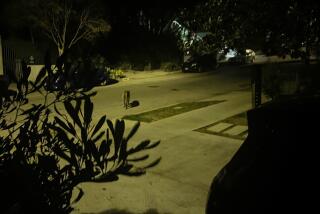Stray Cats : Julian Cabin-Dweller Cares for Cougar, Kittens
JULIAN — Jayne Zoeller strikes people as the kind of person who likes cats, especially ones with green eyes that match hers.
That explains the three little kittens prowling around outside her small, A-frame cabin amid the pine cones and acorns of the Cuyamaca Mountains a few miles south of here.
But it doesn’t really explain the black leopard or the cougar that lounge in her front yard--albeit behind reinforced chain-link fence. And it doesn’t explain the three ocelots, the two other cougars, the bobcat and the margay that Zoeller, 32, has cared for over the years. Nor does it explain the three timber wolves that pace back and forth, in their own enclosure alongside the driveway, serving as watchdogs of sorts over her 2 1/2-acre spread.
But then, this is a woman who has a different perspective on the size of a pet. As a 17-year-old, growing up on New York’s Long Island, she asked her parents if she could keep an ocelot in her bedroom, after enviously eyeing a friend’s pet.
“There was no room in my bedroom for a horse,” she said half-facetiously. Her parents gave it some thought and decided, why not? The ocelot moved in but, when it grew to 40 pounds, it was sent outdoors to live.
Zoeller still feels drawn to large cats. She doesn’t call them “pets” because she knows better; they’re too big and strong to play with or cuddle and aren’t domesticated. She doesn’t go into cages without someone else present, and then only for good reason, like to clean up. She respects the big cats for what they are, even if their purr is as loud as they are big.
She has the necessary permits from the state Department of Fish and Game to keep the animals, and she is submitting grant requests to become publicly funded as a wildlife refuge center for unwanted exotic animals, like those in her menagerie that cannot fend for themselves in the wild.
She needs the financial assistance to care for the animals because the cost of feeding them chicken and beef runs upwards of $200 a month, and she already has spent $8,000 on specially fenced enclosures. Occasional jobs as a waitress in Julian don’t pay enough to care for the animals.
Rather than caring for more animals, why not just stop caring for these, and cut bait altogether as an animal orphanage? Because, she said, existing animal refuge centers are bulging at the seams with unwanted animals and if she abandoned these, they probably would be put to sleep for want of a new home.
“Now that I’ve got the animals, it’s hard to walk away from them,” she said. “What am I going to do, tell Juna (the black leopard) to take a hike? So if I’m going to take care of them, I might as well care for some more.
“I feel like I’m in the Twilight Zone. Now that I’m here, how do I get out?”
Most of the animals Zoeller has looked after during the eight years she has lived here belonged to a friend from Riverside who died of cancer. The animals faced death until Zoeller stepped forward, permit in hand, to care for them.
She acquired the leopard from a Los Angeles woman who ordered it as a supposed pet from an exotic animal broker but then, upon receiving the animal and coming to grips with its size and nature, had second thoughts.
Zoeller’s cougar, named Charlie, came from a Campo woman who also acquired it privately as a pet but then moved away and didn’t know what to do with the animal. She knew Zoeller, and gave her a call.
Zoeller said her parents aren’t all that distressed by her somewhat rugged mountain life style and her continuing love for big cats, “but mom’s always asking me, ‘You don’t think you’re going to find a husband up there, do you?’ ”
It doesn’t matter for now, she said.
She admits it’s lonely, two miles off the highway and without many nearby neighbors to socialize with regularly, but she says she has gotten used to it. “After an hour or so of being around people, I start getting cranky,” she laughed. People make her nervous; the animals are her therapy.
“I write a lot of letters. When I write them in my cabin, the letters get depressing. But when I come down next to Charlie and sit down to write, the letters sound a lot happier.”
More to Read
Sign up for Essential California
The most important California stories and recommendations in your inbox every morning.
You may occasionally receive promotional content from the Los Angeles Times.









